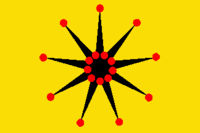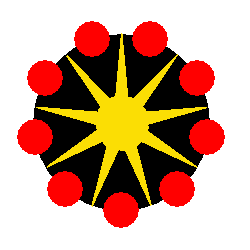Nanhanguo
| Conventional short name: | |
| Local: | Nanhanguo / 南漢國 |
| English: | Nanhanguo (South China) |

| |
| Language: | Mandarin (Nanhanyu) |
| Cities: | |
| Capital: | Chengdu |
| Largest: | |
| Other: | |
| Independence: | from Australasia |
| Declared: | 1952 |
| Recognized: | 1952 |
| Currency: | Yuan |
Nanhanguo is the second largest of the Chinas, and consitutes much of what was the southern and central regions of China.
History
Nanhanguo was held by Australasia, like every other Chinese state, from the Great Oriental War to 1952. It did not rebuild itself quite as quickly as did Beihanguo, but it still rebuilt itself. In 1955, the Nanhan branch of the Beihanguo-based XGD (New Workers' Party) came to power, almost as soon as it was formed. However, the Nanhan road was not quite as smooth as the Chinese one, and there were various dissensions from minorities in Yunnan, which cost money to quash, money which would otherwise have gone into rebuilding the nation. Still, Nanhanguo steadily progressed towards prosperity until 1980, when Hunan proceeded to seize agricultural land on the border. Nanhanguo attempted to repel the invasion, and succeeded with help from China. However, this damaged Nanhanguo and slowed the regeneration process.
In 1989, the XGD collapsed through differences of opinion on agricultural policy and a general election was forced. Since there was no large party and coalitions could not be forged, the country began to collapse, with nearly every bill being defeated by the parliament. The president, Wu Mingxia, declared a state of political emergency and his allies introduced a bill into parliament giving him the ability to pass legislation without parliament. This had a narrow victory in parliament, people seeing the need for a strong government. By 1994, the country was getting back on its feet, but an election was looming, and the president was concerned that he would lose. He passed a bill declaring that a president may delay an election. This received a very bad reaction from the public and the largest opposition party passed a bill of no confidence in the president. This was passed by 60% of parliament, just enough to impeach the president. With the president deposed, a coalition finally began to emerge, recognising the need for cooperation in order to prevent the same thing happening again. The Nanhan Democratic Party, or NMD, emerged from a merger of several different parties. In 1998, it swept to power and returned in the 2001 elections with the largest majority a party had ever had in Nanhanguo. Currently, Nanhanguo is enjoying a boom and is coming near to joining the ranks of China as a world power.
Geography
Borders
North: China (Beihanguo).
West: Tibet.
Southwest: Burma.
South: Hsip'aqa (Tributary state between Burma and Mÿqan̊ Ðaij), Mÿqan̊ Vá, Sipsaqan̊bân̷n̷á (Tributary states between Nanhanguo and Mÿqan̊ Ðaij), Mÿqan̊ Ðaij.
Southeast: Nam Viet, Zhuanguo, Hunan, Nanchang.
East: Shanghai.
